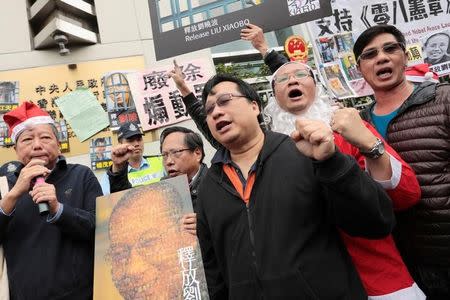Chinese Nobel rights activist Liu Xiaobo released on medical parole

By Christian Shepherd and Ben Blanchard BEIJING (Reuters) - Chinese Nobel Peace Prize winning rights activist Liu Xiaobo has been released from prison on medical parole and is being treated in hospital for late-stage liver cancer, his lawyer said on Monday. Liu, 61, was jailed for 11 years in 2009 for "inciting subversion of state power" after he helped write a petition known as "Charter 08" calling for sweeping political reforms in China. In December 2010, Liu was awarded the Nobel Peace Prize for his activism promoting human rights in China, causing Beijing to freeze diplomatic ties with Norway. China and Norway normalised ties in December last year. Mo Shaoping, Liu's lawyer, told Reuters that Liu was being treated for late-stage liver cancer in Shenyang and that medical parole had been approved. He did not elaborate. The prison bureau of Liaoning province, where Shenyang is located, confirmed the medical parole in a short statement on its website, adding that Liu was being treated by eight people it described as "well-known tumour experts". The public security ministry and justice ministry did not immediately respond to faxed requests for comment. A man who answered the telephone at the Shenyang hospital where Liu is being treated said he could not check information on individual cases as there were too many patients there. Tibetan writer and family friend Tsering Woeser said she had been in tears after reading online reports of Liu's illness. "I'm shocked and deeply saddened," she told Reuters. "All we can do now is pray for him." Liu Xia, Liu's wife, who has been under effective house arrest since her husband won the Nobel Peace Prize, is suffering from depression but has been allowed to visit him in prison about once a month, a source close to the dissident told Reuters. Liu was not allowed to attend his father-in-law's funeral last year and his mother-in-law's funeral this year, said the source who asked not to be identified. Liu had been incarcerated at Jinzhou Penitentiary in Liaoning, his home province in northeast China, before being moved to the hospital for treatment. 'INCREDIBLY SAD' In Oslo, the five-member Norwegian Nobel Committee which awards the peace prize strongly criticised Beijing. "The committee is pleased that Liu Xiaobo is out of prison, but at the same time regrets in the strongest terms that it took a serious illness before the Chinese authorities agreed to release him," it said in a rare statement. "He was in reality sentenced for exercising his freedom of expression and should never have been jailed," it added, reiterating a standing invitation for Liu to come to Norway. Rights group Amnesty International also confirmed the news of Liu's illness. Patrick Poon, a China researcher for Amnesty, said on Twitter that the diagnosis was made on May 23. William Nee, also of Amnesty, said authorities should ensure Liu was getting adequate medical care and he called for the immediate and unconditional release of Liu and his wife. "Obviously, it's a shameful situation and it's incredibly sad to see one of China's most prominent intellectuals suffer from such a terrible illness when he never should've been detained in the first place," Nee said. He also called for the Nobel Committee and the international community to speak up "forcefully" for Liu now. Supporters, many of whom have been campaigning for Liu's release for years, took to Twitter and other platforms to express sadness at the news of his illness and denounce the Chinese government's treatment of him. Activists have flagged numerous cases of abuse in detention over the years, including denial of medical treatment for political activists, charges generally disputed by the government. "There have been lots of similar cases where the individual was released on medical parole just before they die," well-known and outspoken activist Hu Jia told Reuters. China has acknowledged problems of mistreatment in the criminal justice system and has repeatedly vowed to crack down to address them. (Additional reporting by Benjamin Kang Lim, Venus Wu in Hong Kong, Alister Doyle in Oslo and Stephanie Nebehay in Geneva; Editing by Robert Birsel and Toby Chopra)

